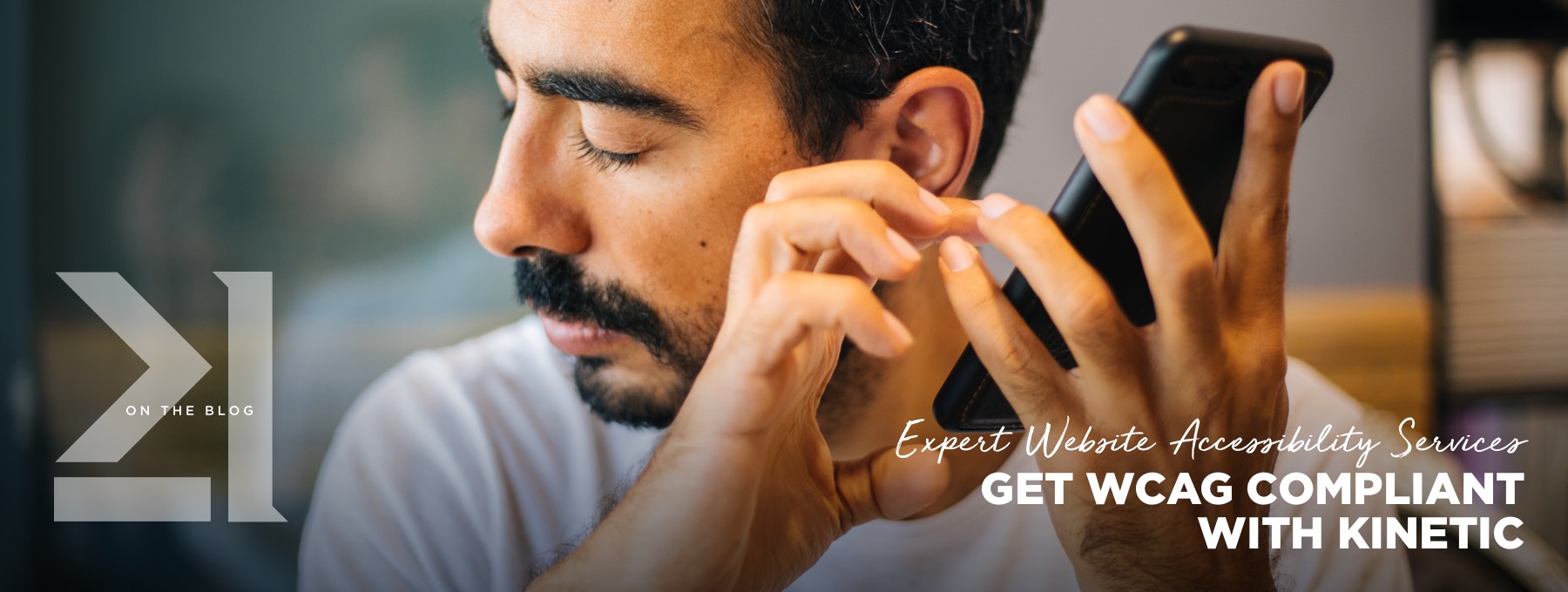WCAG Compliance Made Easy – Kinetic’s Testing & Certification Solutions
In today’s digital world, accessibility is a key component of an inclusive web experience. The Web Content Accessibility Guidelines (WCAG) provide a framework to ensure websites are usable by people of all abilities, including those with visual, auditory, motor, and cognitive impairments. Understanding and implementing WCAG compliance standards on your website is not just a best practice – it’s often a legal necessity.
Failure to meet accessibility standards can expose businesses to legal risks, including lawsuits and fines. Courts have increasingly ruled that websites are considered places of public accommodation, making compliance essential.
What Are WCAG Standards?
WCAG standards, established by the Web Accessibility Initiative (WAI) of the World Wide Web Consortium (W3C), offer a set of recommendations for making web content more accessible. These guidelines focus on four key principles (POUR), ensuring that content is:
- Perceivable – Information and user interface components must be presented in ways that users can perceive.
- Operable – Users must be able to navigate and interact with the interface.
- Understandable – Content and interface elements should be easy to comprehend.
- Robust – Content must be accessible by various assistive technologies and future advancements.
Why Do WCAG Standards Matter?
A more accessible website isn’t just about compliance – it’s a strategic advantage. Accessible sites reach a broader audience, rank higher in search engines, and create a more positive brand experience.
Every website should have an accessibility statement that outlines its commitment to inclusivity. This statement not only improves compliance but also reassures users with disabilities that your site is designed with them in mind.

WCAG Compliance Levels
WCAG compliance is divided into three levels:
- Level A (Minimal Compliance) – Addresses the most basic accessibility barriers. Websites at this level may still present challenges for some users.
- Level AA (Standard Compliance) – The most commonly required level of accessibility for businesses and government websites. It ensures usability for a broader range of people with disabilities.
- Level AAA (Enhanced Compliance) – The highest level of accessibility, covering additional requirements that provide the best possible experience for all users. While ideal, AAA compliance is often impractical for all content types.
Who Needs to be WCAG Compliant?
While every website benefits from accessibility, certain industries and businesses have a greater responsibility to comply with WCAG standards:
- Government Agencies & Public Institutions – Legal mandates such as Section 508 in the U.S. require digital accessibility for government websites.
- Healthcare & Medical Providers – Hospitals, clinics, and insurance companies must provide accessible information, ensuring all users, including those with disabilities, can navigate healthcare resources.
- Financial Services – Banks and financial institutions must offer accessible online banking, statements, and payment services.
- E-commerce & Retail – Online stores must accommodate all users to prevent discrimination and avoid lawsuits.
- Education & E-learning – Schools, universities, and online learning platforms must comply with accessibility laws, such as the Americans with Disabilities Act (ADA) in the U.S.
- Hospitality & Travel – Booking systems, travel agencies, and hotel websites need to be inclusive to cater to all users.
Why Website Accessibility Audits Are Important
An accessibility audit assesses whether a website meets WCAG guidelines and identifies areas needing improvement. Audits are essential for:
- Identifying barriers that prevent users with disabilities from navigating a website.
- Mitigating legal risks by ensuring compliance with regulations like the ADA and the European Accessibility Act.
- Improving user experience for all visitors, including those using assistive technologies such as screen readers and keyboard navigation.
- Enhancing brand reputation by demonstrating a commitment to inclusivity and social responsibility.
Tools to Check Website Accessibility
Several tools can help evaluate and improve website accessibility:
- WAVE (Web Accessibility Evaluation Tool) – A browser extension that provides visual feedback on WCAG compliance.
- axe Accessibility Checker – A widely used tool for automated accessibility testing.
- Google Lighthouse – A built-in Chrome DevTools feature that assesses accessibility performance.
- NVDA & JAWS – Screen readers that allow testing from the perspective of visually impaired users.
- Color Contrast Analyzer – Helps ensure text is readable against background colors.
- Siteimprove Accessibility Checker – Provides detailed insights and recommendations for compliance.

The Value of Expert Accessibility Audits
Having a thorough website audit performed by qualified experts with certified training ensures a comprehensive evaluation and actionable insights for improvement. At Kinetic, our team includes WCAG-certified professionals who have completed training through ADA Compliance, equipping them with the knowledge and expertise to assess and enhance website accessibility effectively. Their certification ensures they can identify complex accessibility issues, implement necessary changes, and help organizations achieve compliance. Partnering with trained professionals helps mitigate legal risks and fosters an inclusive digital experience that benefits all users.
Adhering to WCAG standards is not just about avoiding legal complications – it’s about creating a more inclusive online space. Whether you’re a business owner, web developer, or content creator, prioritizing accessibility enhances user experience, broadens your audience, and ensures compliance with evolving digital accessibility laws. Regular audits, coupled with the right tools, can help you maintain an accessible website that benefits all users.
Ensure Long-Term Accessibility Success with Kinetic
Achieving and maintaining WCAG compliance is an ongoing process that requires expertise, strategic implementation, and continuous monitoring. At Kinetic, we simplify this journey by providing in-depth accessibility audits, expert guidance, and practical solutions tailored to your website’s needs. We help businesses turn compliance into a competitive edge.
Accessibility isn’t a one-time fix – it requires ongoing testing and updates to stay compliant with evolving WCAG standards. Kinetic provides periodic accessibility reviews, ensuring your site remains compliant and user-friendly as content and technologies change.
By partnering with our certified professionals, you gain access to the latest accessibility best practices, ensuring your website remains compliant, user-friendly, and inclusive for all visitors. Let us help you navigate the complexities of digital accessibility so you can focus on delivering exceptional online experiences.
Ready to make your website more accessible? Contact Kinetic today to get started.



